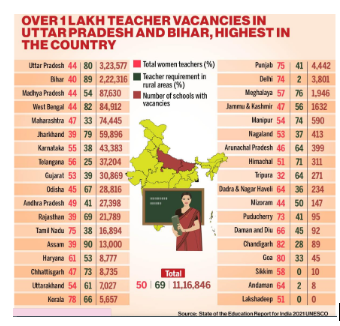

30th May 2023 (6 Topics)
Context
Since at least the 1980s, there have been faculty shortages in India's higher education system.
About the information:
- At least since the 1980s, there have been faculty shortages in India's higher education system, but they now seem to be a persistent condition.
- The lack of an adequate number of faculty members limits the country's desire to be known as a "vishwa guru" and stunts the expansion of its knowledge industry.
- Although the government does gather information on colleges and universities for the yearly All India Survey of Higher Education (AISHE), different institutions choose to participate in this process. No outside organisation has independently validated the information supplied.
Why are there no accurate statistics on the lack of faculty?
- The Ministry of Human Resource Development set up a task force in 2009 to look into the shortage of teaching staff or faculty in the higher education system in India.
- Its 2011 report called for a standing mechanism to monitor the size and quality of faculty resources and for data on faculty members to be made available on the website of every academic institution.
- Most academic institutions have messy and incomplete websites containing only partial information about their faculty bodies.
- The government does collect data on colleges and universities, including the number of faculty members, for the annual All India Survey of Higher Education (AISHE), but the responsibility for the accuracy of the data rests with the institution.
- Adjunct or part-time faculty members are often counted as part of the regular faculty to show off a favourable teacher-student ratio, making it impossible to get a reliable estimate of faculty resources.
Are shortages a quantitative issue?
- Faculty shortages are complex and can be divided as:
- The number of faculty members varying across disciplines, institutions and locations.
- The inability to hire faculty despite a desperate need.
- The unwillingness of institutions to hire faculty members.
- Reservations for Members: These include reservations for members of Other Backward Classes and Scheduled Caste and Scheduled Tribe groups, unwillingness among faculty members to work at select institutions due to their unfavourable location and/or working and living conditions, and a qualitative shortage where actual shortages may not exist.
- Lack of government policies: However, they do indicate that a shortage is not about the numbers alone, and that any attempt at addressing it will require a nuanced set of policies.
More Articles



